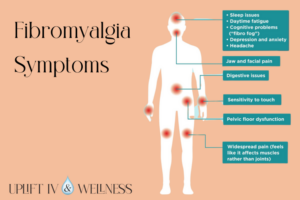
Finding Relief: How IV Therapy Can Help Manage Fibromyalgia Symptoms
July 17, 2024
Brief Overview of Fibromyalgia
Fibromyalgia is a chronic disorder characterized by widespread musculoskeletal pain, fatigue, and tenderness in specific areas. It affects millions of people worldwide, leading to significant challenges in daily life.“Fibromyalgia is a common disease that affects approximately 2 percent of the U.S. population or about 5 million people. It mainly affects women, especially those between the ages of 35 and 55. However, it also may affect men, children and the elderly” (IDPH, 2024). The exact cause of fibromyalgia remains unknown, but it is believed to involve a combination of genetic, environmental, and psychological factors. This condition can profoundly impact a person’s quality of life, making it difficult to carry out daily activities. Utilizing IV therapy for fibromyalgia can offer new avenues for symptom relief and improved well-being.
Common Symptoms and Challenges of Managing Fibromyalgia

Understanding the Symptoms: A visual guide to the common symptoms of fibromyalgia such as chronic pain, fatigue, and sleep issues.
The symptoms of fibromyalgia are varied and can be quite debilitating. Common symptoms include:
- Chronic Pain: Persistent, widespread pain that can be felt throughout the body.
- Fatigue: Extreme tiredness that doesn’t improve with rest or sleep.
- Sleep Disturbances: Difficulty falling asleep, staying asleep, or experiencing restful sleep.
- Cognitive Issues: Often referred to as “fibro fog,” this includes problems with concentration, memory, and mental clarity.
- Mood Disorders: Anxiety and depression are common among those with fibromyalgia.
Managing fibromyalgia can be particularly challenging due to the multifaceted nature of the symptoms. Traditional treatments often include medications, physical therapy, and lifestyle changes, but these may not provide complete relief for everyone.
IV Therapy as a Treatment Option for Fibromyalgia
IV therapy for fibromyalgia offers a promising alternative to traditional treatments. By delivering essential vitamins, minerals, and medications directly into the bloodstream, IV therapy can provide rapid relief from symptoms and support overall well-being. This guide explores how IV therapy can help manage fibromyalgia symptoms and improve the quality of life for those affected by this condition.
Understanding Fibromyalgia and IV Therapy
Explanation of Fibromyalgia and Its Impact on Daily Life
Fibromyalgia is a long-term condition that causes pain and tenderness throughout the body. The pain associated with fibromyalgia is often described as a constant, dull ache that has lasted for at least three months. It can significantly impact daily life, making even simple tasks feel overwhelming. In addition to physical pain, fibromyalgia can affect mental and emotional health, leading to feelings of frustration, helplessness, and depression.
Common Symptoms
Fibromyalgia manifests in various ways, with the most common symptoms including:
- Chronic Pain: Persistent pain that can vary in intensity and affect different parts of the body.
- Fatigue: Ongoing exhaustion that interferes with daily activities and is not relieved by sleep.
- Sleep Disturbances: Problems with sleep, such as insomnia or non-restorative sleep, are common.
- Cognitive Issues: Difficulty with thinking, memory, and concentration, commonly referred to as “fibro fog.”
- Mood Disorders: Increased susceptibility to anxiety and depression.
Current Treatment Options and Their Limitations
Current treatments for fibromyalgia aim to manage symptoms and improve quality of life. These treatments may include:
- Medications: Pain relievers, antidepressants, and anti-seizure drugs are often prescribed to help reduce pain and improve sleep.
- Physical Therapy: Exercises to improve strength, flexibility, and stamina can be beneficial.
- Lifestyle Changes: Stress management techniques, regular physical activity, and healthy sleep habits are essential components of managing fibromyalgia.
Despite these options, many individuals with fibromyalgia find that traditional treatments do not fully alleviate their symptoms. This is where IV therapy for fibromyalgia can play a crucial role, offering an innovative approach to managing this complex condition.
How IV Therapy Helps with Fibromyalgia

IV Therapy for Fibromyalgia: A look at how IV therapy can help alleviate fibromyalgia symptoms through direct vitamin and mineral infusion.
Explanation of IV Therapy and Its General Benefits
IV therapy involves the administration of vitamins, minerals, and medications directly into the bloodstream through an intravenous (IV) line. This method ensures that the nutrients are quickly and efficiently absorbed by the body, bypassing the digestive system. IV therapy is known for its rapid effectiveness, providing immediate relief and supporting overall health and wellness. General benefits include improved hydration, enhanced nutrient absorption, increased energy levels, and detoxification.
How IV Therapy Can Alleviate Fibromyalgia Symptoms
Pain Relief
IV therapy for fibromyalgia can provide significant pain relief. The direct infusion of pain-relieving medications and muscle relaxants can help alleviate the widespread musculoskeletal pain associated with fibromyalgia. Ingredients like magnesium and Toradol are particularly effective in reducing pain and muscle tension, offering immediate and lasting relief.
Improved Energy Levels
Fatigue is a common and debilitating symptom of fibromyalgia. IV therapy can help boost energy levels by replenishing essential vitamins and minerals that support metabolic processes and energy production. B-Complex vitamins, for example, play a crucial role in converting food into energy and maintaining overall vitality. This infusion can help reduce fatigue and improve daily functioning.
Enhanced Sleep Quality
Sleep disturbances are a significant issue for individuals with fibromyalgia. IV therapy can help improve sleep quality by addressing the underlying causes of poor sleep, such as pain and nutritional deficiencies. Ingredients like magnesium and Vitamin C support muscle relaxation and reduce inflammation, promoting better sleep. Enhanced sleep quality leads to improved overall well-being and reduced fibromyalgia symptoms.
Comparison with Other Treatment Methods
Compared to traditional treatments for fibromyalgia, such as oral medications and physical therapy, IV therapy offers several advantages. Oral medications can take time to be absorbed and may not provide immediate relief. Physical therapy, while beneficial, may not address all symptoms. IV therapy, on the other hand, delivers nutrients and medications directly into the bloodstream for rapid absorption and immediate effects. It can be a valuable addition to a comprehensive fibromyalgia management plan, providing targeted relief for pain, fatigue, and sleep disturbances.
Key Ingredients in IV Therapy for Fibromyalgia
Magnesium: Role in Muscle Relaxation and Pain Relief
Magnesium is a critical mineral for muscle function and relaxation. It helps reduce muscle cramps and spasms, which are common in fibromyalgia. By promoting muscle relaxation and reducing nerve excitability, magnesium can alleviate pain and improve overall comfort.
Vitamin C: Anti-Inflammatory and Immune-Boosting Properties
Vitamin C is a powerful antioxidant with anti-inflammatory properties. It helps reduce inflammation, which can contribute to pain and discomfort in fibromyalgia. Additionally, Vitamin C supports the immune system, enhancing overall health and potentially reducing the frequency of fibro flare-ups.
B-Complex Vitamins: Support for Energy Production and Nervous System Health
B-Complex vitamins are essential for energy production and the proper functioning of the nervous system. They help convert food into energy, reducing fatigue and supporting mental clarity. These vitamins also play a role in maintaining healthy nerve cells, which can alleviate some of the cognitive symptoms associated with fibromyalgia.
Glutathione: Antioxidant Benefits and Detoxification Support
Glutathione is a potent antioxidant that helps protect cells from oxidative stress and supports detoxification processes in the body. It can reduce inflammation and oxidative damage, which are often elevated in individuals with fibromyalgia. By enhancing the body’s detoxification capabilities, glutathione helps improve overall health and well-being.
Toradol: Offered as an Add-On for Enhanced Pain Relief
Toradol (ketorolac) is a nonsteroidal anti-inflammatory drug (NSAID) that provides effective pain relief. As an add-on to IV therapy for fibromyalgia, Toradol can help reduce severe pain and inflammation. Its inclusion in IV therapy ensures rapid pain relief, making it an excellent option for managing acute fibromyalgia flare-ups.
By incorporating these key ingredients, IV therapy for fibromyalgia offers a comprehensive approach to managing symptoms and improving quality of life. This innovative treatment can provide immediate relief and ongoing support for those living with fibromyalgia.
Benefits of IV Therapy Over Oral Supplements for Fibromyalgia

Advantages of IV therapy over oral supplements, including faster absorption and higher bioavailability.
Faster Absorption and Effectiveness
IV therapy for fibromyalgia offers significantly faster absorption and effectiveness compared to oral supplements. When you take vitamins and minerals orally, they must pass through the digestive system, where a significant portion can be lost during digestion. IV therapy bypasses the digestive system entirely, delivering nutrients directly into the bloodstream. This direct delivery ensures that the body receives the full benefit of the nutrients quickly, leading to more immediate and noticeable relief from fibromyalgia symptoms.
Direct Delivery to the Bloodstream
One of the primary advantages of IV therapy for fibromyalgia is the direct delivery of essential nutrients to the bloodstream. This method ensures that the nutrients are immediately available for use by the body, providing rapid relief from pain, fatigue, and other symptoms. Direct delivery also means that higher concentrations of vitamins and minerals can be administered safely and effectively, offering superior therapeutic benefits compared to oral supplements.
Treatment Options
Uplift IV Wellness offers a variety of IV therapy treatment options tailored to meet the specific needs of individuals with fibromyalgia. These treatments include:
- Hangover Lifted: Provides hydration and essential nutrients to combat fatigue and pain.
- Uplift Immunity: Boosts the immune system with Vitamin C, Zinc, and B-Complex Vitamins, helping reduce inflammation and support overall health.
- Uplifted Meyers: A comprehensive blend that includes Vitamin C, Magnesium, B12, and B-Complex Vitamins, offering robust support for energy levels and pain relief.
- Uplifted Athlete: Designed to support muscle recovery and enhance physical performance, which can be beneficial for managing fibromyalgia symptoms.
- Uplifted Beauty: Focuses on skin health but also provides essential vitamins and hydration that can improve overall well-being.
What to Expect During an IV Therapy Session for Fibromyalgia
Description of the Procedure
An IV therapy session for fibromyalgia begins with a consultation with a healthcare professional to assess your symptoms and determine the appropriate treatment blend. During the session, an IV catheter is gently inserted into a vein, typically in your arm. The customized nutrient solution is then administered directly into your bloodstream. The procedure is generally painless, and you can relax comfortably while the treatment is delivered.
Duration of the Session
The duration of an IV therapy session for fibromyalgia typically ranges from 30 to 60 minutes, depending on the specific treatment and your individual needs. During this time, you can sit comfortably, read, listen to music, or simply rest. The goal is to ensure a relaxing and stress-free experience while the nutrients are administered.
Safety Protocols and Monitoring
Safety is a top priority during IV therapy sessions. The healthcare professionals administering the treatment are highly trained and experienced. They use sterile, single-use equipment to prevent any risk of infection. Throughout the session, your vital signs are monitored to ensure that you are responding well to the treatment. Any potential side effects are promptly addressed to ensure a safe and effective experience.
Post-Therapy Care and Expected Results
After an IV therapy session, most patients report feeling immediate relief from some symptoms, such as increased energy levels and reduced pain. It is important to stay hydrated and follow any post-therapy care instructions provided by your healthcare professional to maximize the benefits of the treatment. The effects of IV therapy can last for several days, providing ongoing support for managing fibromyalgia symptoms.
By understanding the benefits and what to expect during an IV therapy session, individuals with fibromyalgia can make informed decisions about incorporating this treatment into their management plan. IV therapy offers a promising alternative to traditional treatments, providing rapid relief and improving quality of life for those living with fibromyalgia.
IV therapy for fibromyalgia offers significant benefits such as faster absorption, direct delivery of nutrients, and immediate relief from symptoms like pain and fatigue. Consider adding IV therapy to your comprehensive fibromyalgia management plan for better quality of life. Contact Uplift IV Wellness today to experience the advantages of IV therapy for fibromyalgia and start feeling better.